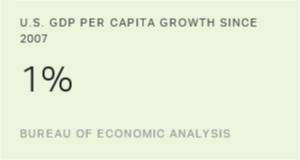Story Highlights
- Economic activity of any significance occurs at the city level
- Strong leadership teams are already in place within cities
- Five in 1,000 adults possess entrepreneurial talent
Finding America's blue-chip entrepreneurs is not the federal government's responsibility. It has to happen at the city level because most economic activity of any significance occurs there.
The reality is, when it comes to creating economic growth and good jobs -- and replenishing America's hollowed-out middle class -- local leadership is far more important than national leadership. This is largely because cities, like companies, exhibit wide variation in economic outcomes.
There are examples of this variation all around the country. Austin and Albany are both capital cities in big American states. Neither city is located by a port or a natural tourist attraction with beaches or mountains. They're pretty much alike, except that economically speaking, Austin wins big and Albany loses big. One city is a drain on America, and the other continues to save it. In another region of the country, Sioux Falls is booming, while Sioux City is not.
Think how different Detroit's outcomes are from San Francisco's. Detroit went from being one of the richest cities in the world to being one of the most spectacular failures. One could even make the argument that citizens in the San Francisco area saved the republic and national job creation by leading the tech-entrepreneurship boom. That boom created the kinds of good jobs that strengthen the American middle class and help drive national economic prosperity.
The difference, in my view, is that Austin, Sioux Falls and San Francisco have deeply caring and highly engaged business, political and philanthropic leaders. Those leaders understand how to build a thriving, growing economy -- one that welcomes business and entrepreneurship and creates good jobs. Albany, Sioux City and Detroit have the opposite in common: leaders with principles, policies, values and beliefs that discourage business and entrepreneurship, if not outright scare them away.
Cities Already Have Strong, Caring Leaders
The good news is, strong leadership teams are already in place within cities -- even failing ones. A natural order is already present, in governments and local businesses and philanthropic entities.
Every city has strong, caring leaders working on numerous committees and initiatives to fuel their local economic growth and to create good jobs. Those leaders should attract innovators, yes, but they'll fail if they don't identify and develop entrepreneurs as well. Simply put, local leaders have to find out who in their town is a high-potential, blue-chip entrepreneur with the God-given talent to build a big, booming business. Those businesses will, in turn, create good jobs, which Gallup defines as work that is at least 30 hours per week for an organization that provides a regular paycheck.
A big part of this effort is getting local businesses involved as well as aligning the strategies and will of all the great local organizations that are already in place, such as Junior Achievement, 4-H Club, DECA, Lemonade Day, Operation HOPE and so on. To find and develop blue-chip entrepreneurs, America needs all institutions and organizations to get involved.
Ultimately, the war for good jobs and sudden economic growth will be fought city by city around the world -- San Francisco vs. Seoul, Brooklyn vs. Berlin. Each city needs its own highly individualized plan because each city has its own unique entrepreneurial talent -- and each must find it, maximize it and retain it. Early identification of rare entrepreneurial talent will be the most significant turning point in recent human history. And this talent is out there today, undiscovered.
Thousands of Future Blue-Chip Entrepreneurs Are in Schools Now
There are nearly 30 million students in U.S. middle and high schools right now. Early Gallup research reports that about five in 1,000 working-age adults in the U.S. possess the rare talents of entrepreneurship, so that means there are about 150,000 future blue-chip entrepreneurs in fifth through 12th grade now, more in college, and tens of thousands more adult potential business builders out there. City leaders should find them all and make their entrepreneurial growth as systematic and intentional as intellectual and athletic growth are. Great business builders are like great scientists or great quarterbacks -- they will respond and accelerate with high-quality attention. Furthermore, without it, their potential is at risk of being underdeveloped, or worse, never developed at all.
The potential of these individuals is unlimited in terms of the economic fortunes they can and will bring to your city. As off-track as our American future appears to be today, a sudden spectacular turnaround is 100% doable if we transform our leadership's thinking and strategies.
Keep in mind that the percentage who can develop new booming businesses is much larger than 0.5%. We estimate that an additional 2% of the adult population possesses the inherent traits and talents to build a business of some size and substance.
We need them all, or we won't create enough good jobs to replenish America's hollowed-out middle class.

